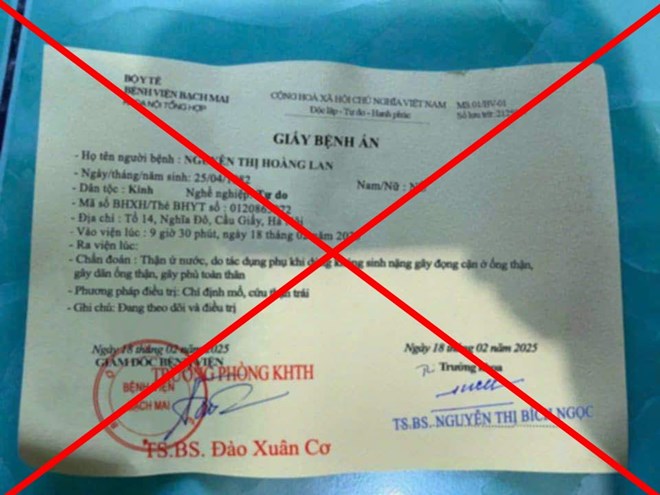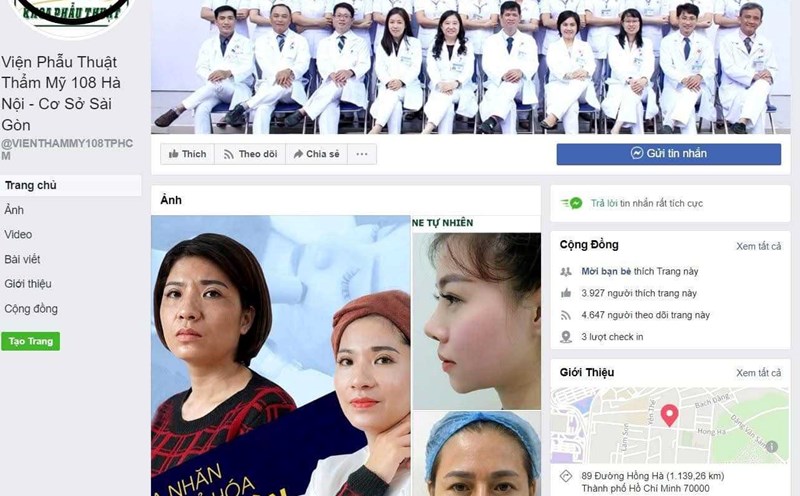Long-standing loans to major hospitals
A fake fanpage of Thu Duc General Hospital (HCMC) has called for a donation of 2 billion VND for accident patients, causing many people to transfer money even though they are not sure.
According to the hospital, this fanpage has no blueprints but still uses names, addresses, phone numbers and official websites to create trust. After copying official posts, the page started posting charity calls and quickly attracted tens of thousands of interactions, many people transferred money to fraudulent accounts.
Thu Duc General Hospital affirmed that there are no charity calling activities other than official channels, and warned people to be vigilant, not to share or transfer money to accounts from impersonating fanpages. People can verify information through the website benhvienthuduc.vn, fanpage with green Facebook.com/benhviendakhoathuduc or hotline 0966 331 010.
108 Central Military Hospital recently discovered many fake fanpages using fake hospital names, logos, and images to post false information, even launching completely fabricated "examination and treatment benefits" programs. The hospital representative affirmed: Currently, there is only one official fanpage named 108 Central Military Hospital (with green records) and the only website is http://benhvien108.vn.
The hospital warns: Impersonation not only damages the reputation of the unit but also directly threatens the health and property of the people. Many facilities also set up "livestream rooms", hired people to fake doctors wearing white blouses to consult online, and made promises of "achieving health after 1 treatment" to lure patients.
Bach Mai Hospital discovered that the personal Facebook account "Lan Nguyen" posted a fake "Sickness Certificate" image under the name Nguyen Thi Hoang Lan (born on April 25, 1982, health insurance code: 0120865972). This document recorded incorrect diagnosis and treatment methods, along with the fake signature of Dr. Dao Xuan Co, and illegally used the Hospital's seal, logo and information, causing serious misunderstanding.

The image of the above fake "Sickness Certificate" was used to call for support from the community. Bach Mai Hospital confirmed that it had never issued any documents related to this case. All official documents must have a signature, legal stamp and be made public on the hospital's website or official fanpage.
Despite repeated warnings, the situation of impersonating doctors and selling drugs online is still common. The subjects often use real images of doctors, attached to the names of large hospitals to create trust, then lure patients to buy drugs of unknown origin. There have been cases where patients have fallen into critical condition because they believe in fake advertisements.
If before, people only met "brokers" standing in front of the hospital gate, now the tricks are much more sophisticated. They set up websites, Facebook, and Zalo to fake doctors and hospitals with the same interface and information as the real one.
"Ghost" clinic sets traps
A survey shows that many fake clinics approach patients through advertising on social networks, targeting directly those who search for keywords on dermatology, obstetrics, gynecology, cosmetics, etc. When users leave their phone numbers, an employee immediately calls them to invite them for examination.
These units also created fake websites with easily confusing domain names such as benhviendailieutw.net, bvvphusansg.org... The pages all cut and paste images from newspapers, optimize keywords to display Google search results, making many people mistakenly think it is the official page.
After attracting patients, they continue to threaten serious illnesses, offer expensive treatment regimens and promotions "only applied today". Many people, out of fear, have spent tens of millions of VND on baseless methods.
Faced with this situation, many large hospitals such as Bach Mai, Cho Ray, Nhi Trung Trung... have continuously issued warnings, publicized official channels and advised people not to trust unverified websites. Some hospitals have also sent official dispatches to authorities to handle cases of forgery, while increasing communication on official channels to protect people.











